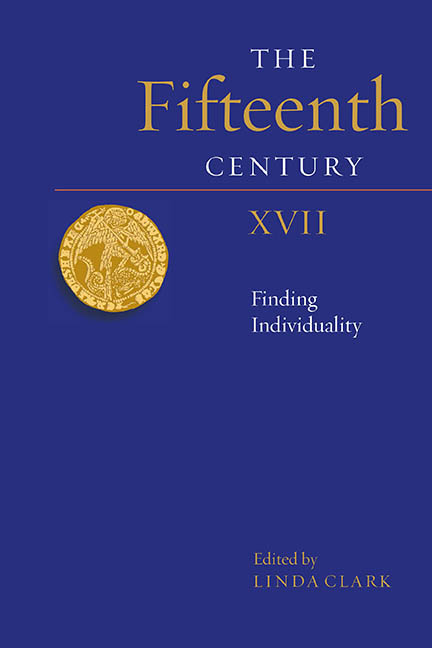Book contents
- Frontmatter
- Contents
- Contributors
- Preface
- Abbreviations
- Royal Wills, 1376–1475
- Propaganda, Piety and Politics in the Fifteenth Century: Henry V’s Vernacular War Letters to the City of London, 1417–21
- ‘To Be of Oon Demeanyng and Unite for the Wele of Your Self and of the Contre There’: Yorkist Plans for the Lordship of Ireland, the Last Phase
- A Mirror for a Princess: Antoine de la Sale and the Political Psyche of Margaret of Anjou
- Margaret of Anjou and the Language of Praise and Censure
- On ‘Peyne of their Lyfes … they Shuld no Verdit gif, but if they Wold Endite the Seid William Tresham of his Owen Deth’: the Murder of Lawyers in Fifteenth-Century England
- ‘Stond Horeson and Yelde thy Knyff’: Urban Politics, Language and Litigation in Late Medieval Canterbury
- ‘In to the Sterre Chambre’: Female Plaintiffs Before the King’s Council in the Reign of Henry VII
- Index
- Contents of Previous Volumes
‘In to the Sterre Chambre’: Female Plaintiffs Before the King’s Council in the Reign of Henry VII
Published online by Cambridge University Press: 19 August 2020
- Frontmatter
- Contents
- Contributors
- Preface
- Abbreviations
- Royal Wills, 1376–1475
- Propaganda, Piety and Politics in the Fifteenth Century: Henry V’s Vernacular War Letters to the City of London, 1417–21
- ‘To Be of Oon Demeanyng and Unite for the Wele of Your Self and of the Contre There’: Yorkist Plans for the Lordship of Ireland, the Last Phase
- A Mirror for a Princess: Antoine de la Sale and the Political Psyche of Margaret of Anjou
- Margaret of Anjou and the Language of Praise and Censure
- On ‘Peyne of their Lyfes … they Shuld no Verdit gif, but if they Wold Endite the Seid William Tresham of his Owen Deth’: the Murder of Lawyers in Fifteenth-Century England
- ‘Stond Horeson and Yelde thy Knyff’: Urban Politics, Language and Litigation in Late Medieval Canterbury
- ‘In to the Sterre Chambre’: Female Plaintiffs Before the King’s Council in the Reign of Henry VII
- Index
- Contents of Previous Volumes
Summary
Fifteenth-century England was notoriously litigious and recent studies have fruitfully revealed the extent to which women were regularly caught up in legal business. Nevertheless, while we know an increasing amount about women's use of the common law courts, customary courts, the spiritual courts and those petitioning the equitable jurisdictions of chancery and requests in this period, comparatively little has been written about the female litigants who petitioned the prerogative court of Star Chamber. In one sense this is understandable. In the sixteenth and seventeenth centuries this court would attract thousands of litigants, particularly following its development and promotion under Thomas Wolsey (chancellor 1515–29). In the late fifteenth century, however, its activities remained embedded within the king's council; its personnel and processes fluid and not yet fully formalised. There was no separate court of Star Chamber; rather the ‘Star Chamber’ was primarily a location within the palace of Westminster where the king's councillors would conduct their varied business. Nevertheless, because the king's council had the power to hear all sorts of petitions it drew an increasing number of litigants in the late fifteenth century, many of whom believed that redress would come from the council sitting ‘in the sterre chambre’. Consequently, their petitions and the related pleadings and proofs generated a body of material unusually rich in detailing individuals’ interactions with the law. These records have not been entirely neglected and have proved attractive to local and regional historians, as demonstrated by the early twentieth-century flurry of printed transcriptions and abstracts in several county record series. Yet, their potential as sources for broader social, legal or cultural analyses of the early Tudor period has not been fully realised. Furthermore, those that have been published have been consciously or unconsciously biased towards male litigants. Geoffrey Elton's Star Chamber Stories, for example, consisted of six tales, which reflected mid-twentieth-century interests in the religious, economic and educational aspects of life in Tudor England; all the litigants were male, and women rarely featured in the narratives.
This essay will assess more fully the value of these documents for an understanding of female litigation, and the way in which women resorted to Henry VII's council in their attempts to access justice.
- Type
- Chapter
- Information
- The Fifteenth Century XVIIFinding Individuality, pp. 129 - 144Publisher: Boydell & BrewerPrint publication year: 2020

